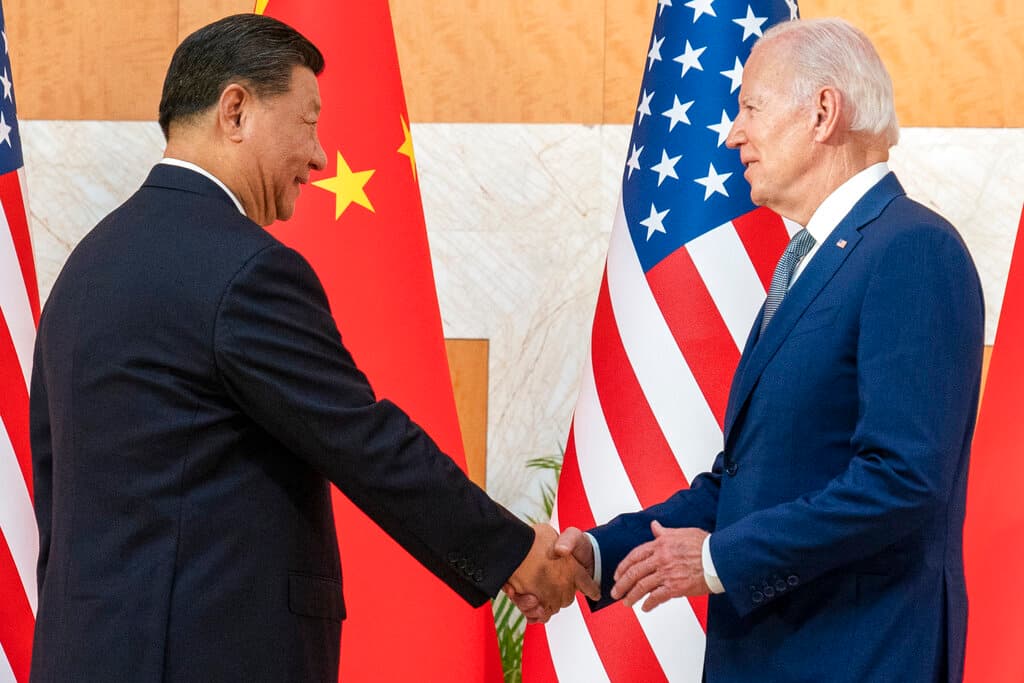Who Lost America?
It’s beyond, ‘Who lost China?’ The question we’re going to be left with soon is much bigger.

Well, we were warned. “A Biden administration will do more than restore our historic partnerships,” the Biden-Harris 2020 campaign website reads, “it will lead the effort to reimagine them for the future.” What dreaming, indeed, President Biden’s administration has been doing. For few could have anticipated the barrage of global shifts now unfolding on its watch.
Mr. Biden, no doubt, is not single-handedly responsible for the state of the international order. Yet his mismanagement of America’s domestic and foreign affairs has so undermined our authority that it has cleared the way for political currents long kept at bay to surface and, it would seem, start to succeed.
At the center of these currents is Communist China. Its efforts to “move toward center stage,” as President Xi said at the 19th National Party Congress, are not a sudden affair. They are the upshot of an ideology and of policies set into motion at the People’s Republic’s founding –– punctuated by Chairman Mao’s declaration that “the Chinese people have stood up.”
In this regard, too, they are, for Communist China, necessary steps along its destined path toward global power and primacy. The Communist Party has long held that China cannot reside in a system led by America. Its drive to reorder the world predates Xi Jinping. Even Deng Xiaoping — the once darling of the West — called for a “new international order” rooted in CCP doctrine and forged against “hegemonism.”
Only America and the West were then too enthralled by the ostensible end of the Cold War to notice. For while we brazenly assumed that our way of seeing the world had become so entrenched in the global system that it would go unchallenged, China and its allies were, indeed, à la Deng, biding their time.
We “must be prepared to face the hegemony of the superpowers and, when the time is right, to challenge them,” Fidel Castro said at the 1983 Non-Aligned Movement summit.
That time, apparently, is now –– and in its desire to refashion the global order, Beijing is not alone. For since at least the Bandung Conference, which in 1955 prefigured the so-called non-aligned movement, it has had the tacit support of a mélange of leftist states united in their hope of a debilitated America and the emergence of a new international order.
Should China be at the center of that order, so be it. It is, after all, a comrade. The current challenge, then, is not one of a singular China. It is one of China in concert with a reinvigorated global left.
In Brazil, President da Silva has warned of a transnational web of right-wing forces against which the global left must unite. During his visit to China this week, he and Mr. Xi penned a deal that would see their countries trade in their respective currencies. He has also called on the BRICS nations — in addition to Brazil they are Russia, India, China, and South Africa — to consider an alternative currency to replace the dollar in foreign trade.
“Who decided that the dollar was the trade currency after the end of gold parity?” Mr. da Silva asked. His visit is broadly symbolic of Latin America’s steady drift away from America and toward China. Across the region, leftist leaders have been deepening their ties with Beijing, including in such areas as chip manufacturing, port construction, and satellite stations.
Across much of Europe, too, a similar trend. Despite some grumblings around President Macron’s most recent suggestion that Europe loosen its ties to Washington in favor of his pet theory, “strategic autonomy,” and an ostensible buttressing of ties with China –– a point on which he doubled down this week –– among his European peers he is not alone in his theorizing.
“I think quite a few really think like Emmanuel Macron,” the Belgian president of the European Council, Charles Michel, said on Tuesday. Indeed, that would appear to be the case.
“We need China to solve the global challenges,” Europe’s foreign affairs attaché, Josep Borrell, mused at Brussels earlier this month. Spain’s leftist prime minister, Pedro Sánchez, has previously praised Beijing for its “transparent, and rules-based multilateral system.” Like Mr. Macron he, too, has called for a new international order. As has Germany’s chancellor.
From Europe to the Middle East, Africa to Latin America, the historical tide appears to be rising to meet China’s global ambitions. This is not by chance or good fortune. It is a shift long in the offing –– one now hastened by President Biden’s regrettable lack of strategic vision and failed foreign policy.
For where Communist China has advanced, America has retreated. As China’s military has strengthened, ours has weakened. While the CCP speaks of a “community of common destiny” — jargon, no doubt, yet jargon that resonates nonetheless — Washington advocates a version of democracy rooted in the woke politics of our left. That version does not resonate among many of our allies, whose societies remain governed by traditional values.
America under Mr. Biden’s presidency is then left increasingly enfeebled and marginalized — and the global left has noticed.
In 1949, “Who lost China?” was the question that tortured the American political establishment. More than 70 years later, the question that now hangs in the air is how and why political currents long contained were allowed to resurface and advance. How and why the Biden administration appears to have lost interest in its own country –– and how to stem the tide before we are left to ask, “Who lost America?”

